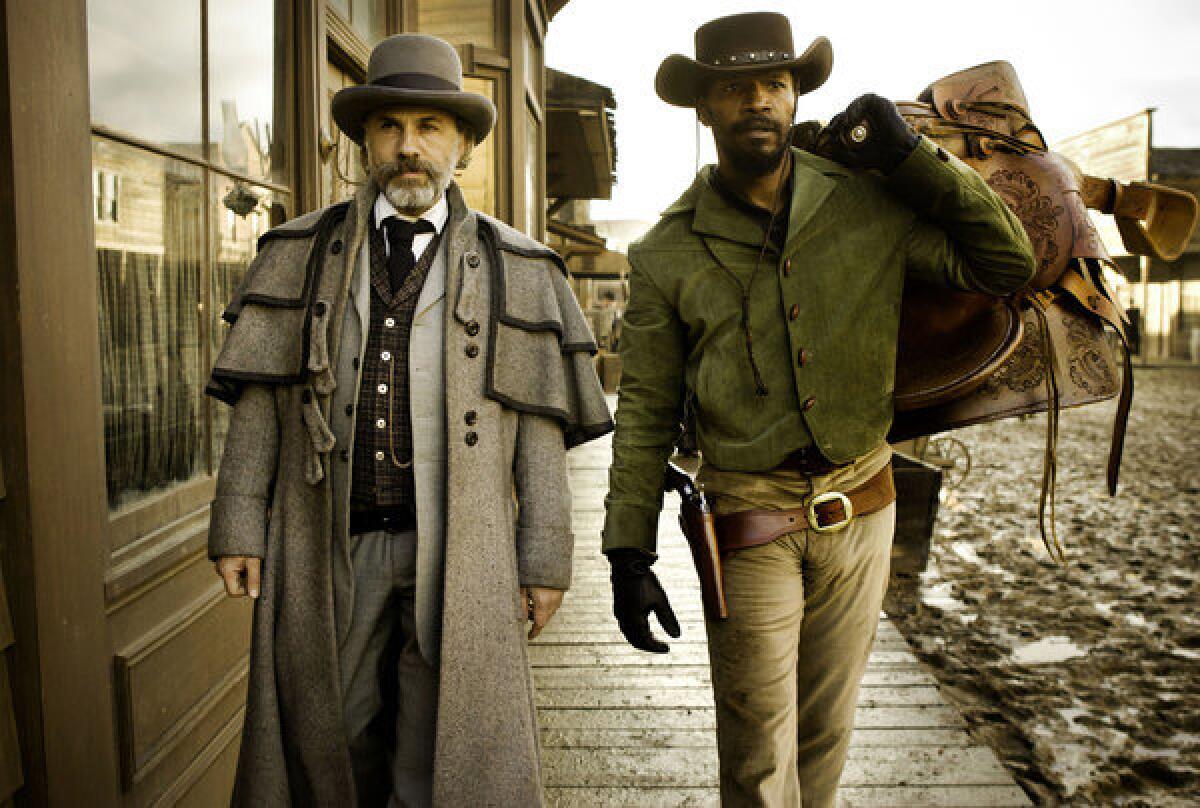After the controversy, ‘Django Unchained’ flops in China

- Share via
“Django Unchained” had a long road to theaters in China -- and without much of a payoff.
The Sony Pictures Entertainment film was pulled from theaters April 11 -- the day it premiered -- with officials in China offering no reason for the move. However, after the Quentin Tarantino picture underwent an edit, which excised a handful of graphic sequences, China’s State Administration for Radio, Film and Television (SARFT) allowed it back into theaters about a month later.
But since it was re-released May 12, “Django Unchained” has attracted few moviegoers, grossing just $2.75 million, according to Sony. The poor performance in China -- the world’s second-largest film-going market behind North America -- is in stark contrast to the movie’s global success: “Django” grossed $424 million worldwide, including $163 million domestically.
And though the violent drama remains in theaters in China, its box office take in that country isn’t expected to increase dramatically.
Experts who follow the Chinese film business aren’t surprised that the film, which stars Jamie Foxx in the titular role of a former slave out for revenge, fared poorly in China. They say a handful of factors contributed to the weak showing, including increased competition in the marketplace, a lack of sustained interest in the movie after the initial false start, the proliferation of pirated copies of the film, and moviegoers’ unhappiness over edits that altered Tarantino’s work.
When the film was re-released it was forced to go head-to-head with the superhero hit “Iron Man 3,” the Tom Cruise sci-fi film “Oblivion” and the animated family picture “The Croods.”
What’s more, “Django” played on fewer screens when it went back into theaters than it did when it debuted in April. According to a source with knowledge of the film business in China, “Django” opened on about 6,200 screens in April, but was down to roughly 5,700 screens when it was re-released in May. Also, Sony’s marketing campaign for the movie was at its most robust ahead of the aborted April bow, with very little additional advertising done before the May re-release.
Sony declined to comment.
PHOTOS: The faces behind ‘Django Unchained’
“Django” was hailed as the first Tarantino film to receive a release in China. And there was a hope that the film, for which the writer-director won the Oscar for original screenplay, had the star power that could attract Chinese audiences. In addition to Foxx, the movie also stars Leonardo DiCaprio and Christoph Waltz, who won the Academy Award for supporting actor for his portrayal of a bounty hunter working in the South in the late 1850s.
Some observers believed that Chinese audiences would have no trouble connecting with the issue of slavery in America and would support the movie, even though the western genre doesn’t have much resonance in China.
“The Chinese in general know about America’s past -- they know about the bad things,” Los Angeles-based business consultant Stanley Chao, author of “Selling To China: A Guide to Doing Business in China for Small- and Medium-Sized Businesses,” told the Los Angeles Times in March. “They learned about slavery and the Wild West in school. If they hear about a U.S. movie that has violence and gun-slinging, that will make them interested to see it.”
Some of that violence, of course, was cut from the film before it was re-released. It has been widely reported that about three minutes were trimmed from “Django,” with scenes depicting a bloody shootout, vicious dog attack and the torture of a nude Django and his wife (played by Kerry Washington) all removed.
But cuts to the film may have neutered it -- upsetting audiences not only because of the potentially adverse affect the edits had on the story but also due to the larger cultural significance of the changes.
USC political science professor Stanley Rosen, a Chinese film expert, said that word of mouth about the film “was brutal in terms of criticizing authorities” for requiring the cuts. He also said that Chinese bloggers excoriated the “official,” state-approved version of the film. “Fans of Tarantino weren’t going to give the censors their money by showing up,” Rosen said.
And those fans may have been able to see an unedited version of the film even before it was put back into theaters in May. According to Mathew Alderson, a Beijing-based entertainment attorney with law firm Harris Moure, pirated “Django” DVDs were widely available in China prior to the film’s initial release in April.
“The controversy surrounding the initial release would be expected to have driven interest in the pirated DVD versions,” said Alderson in an email interview.
Such piracy is likely to have tamped down demand to see “Django” on the big screen. But both Rosen and Robert Cain, who runs the blog Chinafilmbiz, said they never expected the film to be a hit in China.
“It was really baffling that [SARFT] even considered a release,” said Cain, a producer and veteran studio consultant on China. He noted that the violence and nudity in the film “breaks all the rules and taboos of Chinese productions. The decision was made to ignore those traditional strictures -- that was really surprising.”
But Rosen has a theory about that, saying that SARFT, China’s censorship body, could have felt that it was important to let a movie like “Django” play in the country to demonstrate to the world that it is becoming a more tolerant, open place. He noted that another provocative film, 2005’s “V For Vendetta,” was aired on China’s national television station in December. That movie delves deeply into issues of fascism, anarchism and terrorism.
With “Django,” said Rosen, SARFT “may have been saying, ‘If China is going to be world class and a world power, we can’t keep our heads in the sand all the time.’”
Ultimately, there also could have been another, simpler reason for the poor box office performance -- audiences simply didn’t connect with the film, Cain said.
“The performance shows that there wasn’t an audience for the movie in the first place,” he said. “The controversy did get a lot of attention and clearly it didn’t translate into a desire to see the movie.”
Times staff writer Amy Kaufman contributed to this report.
ALSO:
What’s next for Sony in wake of ‘After Earth’?
‘Django Unchained’ abruptly pulled from China theaters
Speculation swirls around Nikki Finke’s future at Deadline Hollywood
More to Read
From the Oscars to the Emmys.
Get the Envelope newsletter for exclusive awards season coverage, behind-the-scenes stories from the Envelope podcast and columnist Glenn Whipp’s must-read analysis.
You may occasionally receive promotional content from the Los Angeles Times.







